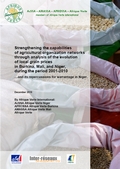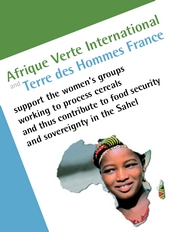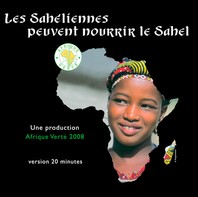










|
DOCUMENT OF CAPITALIZATION ON THE ANALYSIS OF PRICE TRENDS FOR CEREALS IN THE SAHEL, 2001-2010 - New 
Download the full document (english version):> Strengthening the capabilities of agricultural organization networks… (2010, - 2 Mo)
ADVOCACY CAMPAIGN

-
the States encourage local credit structures to improve access to credit for the women working to process cereals so that they can invest and increase their production capacity;
-
the States and development partners encourage the creation of collective storage infrastructures to conserve the quality of the cereals;
-
the States provide tax advantages for certain processing equipment (mills, deshellers, driers, etc.) so as to improve food production;
-
the States reduce VAT on processed products, bringing them into line with unprocessed cereal which is not taxed;
-
the States revise fees of analysis laboratories and ensure the availability of food packaging which meets applicable standards so as to ensure consumer safety

Afrique Verte wonders : should Sahel coutries produce more, or should they transform local cereals to meet with the urban consumer’s growing demand on food ready for use?
Afrique Verte International
 Afrique Verte International : an NGO with 4 partners (APROSSA in Burkina Faso, AMASSA in Mali, AcSSA in Niger, Afrique Verte in France) that promotes food security and sustainable development in the Sahel.
Afrique Verte International : an NGO with 4 partners (APROSSA in Burkina Faso, AMASSA in Mali, AcSSA in Niger, Afrique Verte in France) that promotes food security and sustainable development in the Sahel.
Afrique Verte International :
In France and Europe, Afrique Verte :
Established in 1990, Afrique Verte is the result of lobbying carried out since the 1980s by the NGOs Terre des Hommes, Frères des Hommes and Peuples Solidaires. In 1985, the campaign “Pour une Afrique Verte” gathered more than 20,000 signatures that were presented during a roundtable to the Minister for Cooperation at that time, Jacques Pelletier. As a result of that initiative, the Ministry agreed to allocate 10 per cent of its budget for financial assistance supporting food assistance for supporting small-farmer organizations in sub-Saharan Africa and to create more autonomous local marketing circuits.
The three internationally recognized founding associations have been members of Afrique Verte since 1990. In addition, the Association Française des Volontaires du Progrès (AFVP) and the Comité Catholique contre la Faim pour le Développement (CCFD) joined the group at the beginning of the 1990s.
Afrique Verte – a few facts :
Resources of Afrique Verte 2008 : 1.374.000 euros, of which:
Main donors : the European Commission,
-
- Reinforces the professional capacities of small-farmer organizations;
- Participates in the consolidation the structuring of small-farmer organizations;
- Promotes the marketing of local cereals.
- Promotes a more accurate appreciation of Africa among the general public and encourages civic commitment, especially among young people;
- Participates in lobbying activities promoting sustainable development and improving North/South exchanges.
- 11% from in-house funds and private sources;
- 68% from public sources (central government and decentralized administrations, European sources);
- 21% from other income.
the French Ministry for Foreign Affairs, the Regional Councils of Ile-de-France, Lorraine, Nord-Pas-de-Calais, Pays-de-Loire; the Conseil Général of Finistère; the Foundation Michelham (Switzerland) and the Foundation Stromme (Norway); private donors, individuals and businesses.
The Afrique Verte International staff : more than 50 persons in 4 countries promoting food security
In France, the coordination and technical support team is made up of 3 employees in four areas: management, financial management, education for development and communication, and partnerships and fundraising.
In the Sahel, a central coordinating team is based in each of the three countries in the capital, and promoters-trainers are based in the field in the programme’s target areas. The teams are made up of about 50 local employees.

| S'abonner au flux RSS | Site réalisé avec le concours du |

|
© UGOCOM |


